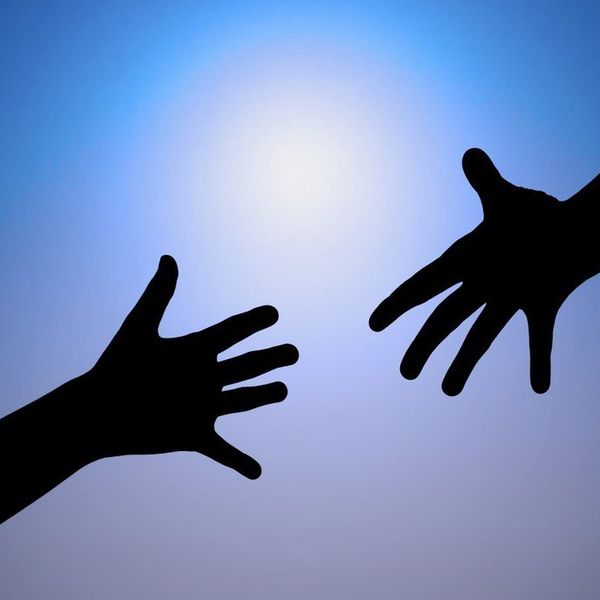I've been a college student struggling with waves of depression for about two years now. I am currently receiving treatment and blessed enough to have the most wonderful and supportive parents around me. For a long time, I attempted to hide my feelings, but recently I have decided to be more public and express the feelings dragging me down, inhibiting, and debilitating my ordinary aspects of daily living.
I’ve never really known how to articulate “I have depression” because it's not a constant feeling. It comes and goes at the most unanticipated times, which styles it as illegitimate. However, since being open about it, I have had many supporters and affirmative retorts.
But every so often I receive questions like, “What do you have to be sad about?” or statements like, “There are people struggling with similar thoughts, so just get over it.”
These are the responses that really agitate me. They are wholly insensitive replies that are unsupportive and obstructive to hear when you are perceptually struggling internally and has lead me to suppose that there is a fundamental misconstruction of depression.
Depression is not seeking attention. Depression is not self-pity. Depression is not “in your head.”
Depression is depression—and just that.
It is a legitimate mental illness that encumbers your ability, a heaviness on your shoulders that hinders you everyday, a biochemical disproportion, it is an authentic disability that affects so many individuals everyday and is entirely misunderstood.
Depression tells you that you are worthless. It overpowers you with thoughts of fault and futility. I am almost captivated by how encumbering (physically and mentally) depression truly is. It is not something somebody solicits, if we possessed the faculty to just “get over it,” wouldn’t you reason we would?
My story is one of unmitigated abruptness. I was constantly smiling. I had an enormous heart, always laughing and craving to make people laugh, too. Ever since I could recollect, I constructed a path that I established for myself and ensured I completed whatever I could to attain my ambitions. I was so motivated and driven. My family was so proud of me…until one day everything just shattered and inverted before I had a chance to react.
I attended a magnet school-high school, called the Academy for Allied Health and Biomedical Sciences, intense and concentrated in medicine, which is what I aspired to pursue ever since I was a little girl; forever craving to help people. I took UMDNJ college classes in high school, graduated in the top 3 percent of my class, and later enrolled into Boston University.
I encountered a prodigious experience at Boston University. I discovered myself arriving at an obscure and dark abyss, so fleetingly, there was no escape. Getting up in the morning mandated tremendous exertion, things appeared as if they existed in slow motion, simple decisions became a chore and increasingly arduous—nothing seemed right.
My grades began to slip, I attended fewer and fewer classes depleting myself and perpetually dwelling in bed, having no energy or inclination to get up. Days began to progress slower. I remember myself thinking, “I want to sleep so the days just go by quicker.” I had an internal crisis where my purpose in the world was questioned. To lay it simply, I felt comparable to a mere speck of dirt on the windshield of life anticipating to be swept away. All this transpired in a matter of two weeks.
I became exceedingly anxious. I was not the person I was before. A glass wall stood amidst the world and me—so impenetrable despite how much I cried or screamed—nothing or no one could help me.
I transferred after the first semester to Rutgers University, which was closer to home. While getting treatment, I opted to return to college; optimistically thinking I was recovered. Unaware that depression evolved in oscillating patterns I found myself undergoing the same symptoms; subsequently, against my will, withdrawing from college and attending an inpatient hospitalization program.
At this point I comprehensively lost who I was. I could not identify what I sought, I did not see my purpose in life, I did not even want to continue living—and that was not me. I always loved life and filled my life and others’ lives with positivity. I just could not appreciate the positives any longer. I was drowning and suffocating within the pessimistic thoughts of my own cognizance, which raced incessantly of memories of failure and negativity.
Through rigorous treatment I eminently gained knowledge about depression, anxiety and mental illness through individuals that shared equivalent familiarities undeterred by their age. I encountered children 8 years old and adults 80 years old that genuinely authorized, validated, and justified my symptoms though their personal narratives.
Enduring depression comes with the cognitive triad, as I like to call it—feeling helpless, hopeless, and worthless. Humans ascribe an arbitrary meaning to life, which is unbelievingly depressing in itself, causing one to question whether lives have a greater purpose. There are, of course, limitations of anatomical capacity, but maximizing our potential and continuing the quest towards “self-actualization” termed by Maslow, allows us to accept those limitations, rather formulating it to be more freeing knowing you construct your reality—not the depression.
I learned this through my time in IOP (Intensive-outpatient) program. No one truly, sincerely understands your internal troubles which is what makes depression so challenging to understand. However, similar viewpoints and acquiring knowledge of similar experiences through equals that have been through or are presently encountering depression, offers hope—which is something people who insensitively suggest, “What is there to be sad about?”—cannot empathize with.
I will conclude with an allegory, which conveys my position and outlook entirely.
I fell into an abysmal, dark, hole that I could not get escape. A man strode by the hole and I pleaded for him to help me get out. He said he was a psychiatrist and that he couldn’t get me out, but tossed me some pills and said I will soon feel better. He was right, I did begin to feel better, although it did not help me out of the abyss I subsisted in. Another man walked by and, again, I pleaded for him to assist me out. He alleged he was a priest and that he would pray for me and that I too should pray, and God will guide me in seeing a way out. I prayed and prayed for months and still I was imprisoned in a boundless crater with no way out. Finally, another man passed by and with barely any vitality left, I begged for his help. He jumped into the abyss with me and I questioned his sanity—Now there are two people in this abyss and no means of outlet. I rapidly became distressed undeterred by my disquietude, he calmly stated, “I have dwelled in this depth before, follow me and I will teach you the way out.”
If I was to provide one solitary piece of guidance to others who are struggling, it would be to not suffer in silence. There are people who want to help, who want to understand, and who have subsisted through similar situations and have furthermore lived a happy and fulfilling life. At the time being, the scope of the future is burdensome to comprehend and the field of view is narrow, but I promise you it surpasses. It is the depression echoing, captivating, and putting the cuffs on your being. It is the imbalance occurring within you that sources and reasons these doubts, but it will pass with time, patience, and a great deal of perseverance. I am certainly not proposing that it is painless, straightforward, and effortless. That is the furthest from what I am posing. It will unquestionably be the most demanding and visionary situation you have endlessly had to triumph, but amid the appropriate guidance, mechanisms, and implementation it is feasible although momentarily it may not seem so. I am not entirely recovered, nor do I foresee if I will ever be, but I can optimistically declare to you I am not in that dark abyss any longer and I will do anything in my faculty to abstain from it. The cards you were dealt are unfortunate and I would not wish depression upon anyone.
You should most certainly not feel guilty for feeling the way you do. It is, to me, parallel to breaking a leg—society offers help to those on crutches by opening doors, medically exempting them, or permitting them to be in front of a congested area.
Why are we so accepting of (physical) body parts breaking, but not accepting of our minds breaking?





















